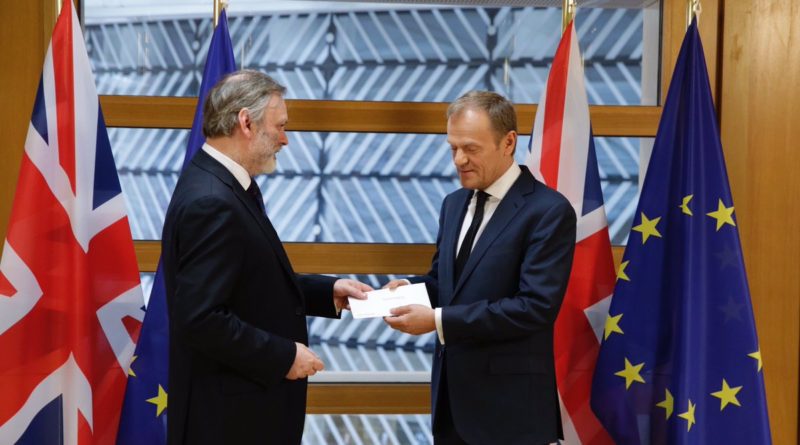Everyone agrees: citizens first in EU-UK negotiations
The momentous letter announcing the UK decision to leave the European Union was delivered to Brussels on March 29th. Two years of negotiations and political games are ahead. The results will have an impact on the lives of some 4.5 million people (the estimated 3 million EU nationals in the UK and 1.2 million Brits living in EU countries). At present, their right to live in another EU country is secured by EU Treaties, but what will happen once these will cease to apply in the UK?
All parties involved in the negotiations have so far said that securing people’s rights is a priority. Here is what the official documents say.
The letter of Theresa May, British Prime Minister, to Donald Tusk, President of the EU Council, starting the formal exit of the UK from the EU:
We should always put our citizens first. There is obvious complexity in the discussions we are about to undertake, but we should remember that at the heart of our talks are the interests of all our citizens. There are, for example, many citizens of the remaining member states living in the United Kingdom, and UK citizens living elsewhere in the European Union, and we should aim to strike an early agreement about their rights.
We should work together to minimise disruption and give as much certainty as possible. Investors, businesses and citizens in both the UK and across the remaining 27 member states – and those from third countries around the world – want to be able to plan. In order to avoid any cliff-edge as we move from our current relationship to our future partnership, people and businesses in both the UK and the EU would benefit from implementation periods to adjust in a smooth and orderly way to new arrangements.
The EU response is in the European Council draft negotiation guidelines that the EU27 will have to approve at a summit on April 29th:
The right for every EU citizen, and of his or her family members, to live, to work or to study in any EU Member State is a fundamental aspect of the European Union. Along with other rights provided under EU law, it has shaped the lives and choices of millions of people. Agreeing reciprocal guarantees to settle the status and situations at the date of withdrawal of EU and UK citizens, and their families, affected by the United Kingdom’s withdrawal from the Union will be a matter of priority for the negotiations. Such guarantees must be enforceable and non-discriminatory.
Regarding the procedure, the guidelines add:
The first phase of negotiations will aim to:
– settle the disentanglement of the United Kingdom from the Union and from all the rights and obligations the United Kingdom derives from commitments undertaken as Member State;
– provide as much clarity and legal certainty as possible to citizens, businesses, stakeholders and international partners on the immediate effects of the United Kingdom’s withdrawal from the Union.Negotiations under Article 50 TEU will be conducted as a single package. In accordance with the principle that nothing is agreed until everything is agreed, individual items cannot be settled separately.
This means that even if there is an early agreement on citizens rights, most likely it will be signed as part of the exit treaty, at the end of the negotiation period. It is unclear what will happen in case of no deal.
On the day the UK launched the exit procedure, the East European Resource Centre made an appeal to the UK government “to ensure that East Europeans’ future rights, and their voice, are taken account of in the fullest extent during the negotiations.” The3million group of EU nationals in the UK wrote a letter to the British Prime Minister asking the government and the EU to “jointly shoulder responsibility and decouple citizens rights from the main negotiations.
The European Parliament, which is not directly involved in the negotiations but will have to give its consent to the final deal, voted a resolution establishing its red lines. The document mentions
The legal status of EU citizens living or having lived in the United Kingdom and of United Kingdom citizens living or having lived in other Member States, as well as other provisions concerning their rights
as the first item that should be addressed in the withdrawal agreement. It also:
Requires the fair treatment of EU27 citizens living or having lived in the United Kingdom and of United Kingdom citizens living or having lived in the EU27 and is of the opinion that their respective rights and interests must be given full priority in the negotiations;
demands, therefore, that the status and rights of EU27 citizens residing in the United Kingdom and of United Kingdom citizens residing in the EU27 be subject to the principles of reciprocity, equity, symmetry and non discrimination, and demands moreover the protection of the integrity of Union law, including the Charter of Fundamental Rights, and its enforcement framework; stresses that any degradation of the rights linked to freedom of movement, including discrimination between EU citizens in their access to residency rights, before the date of withdrawal from the European Union by the United Kingdom would be contrary to Union law.
In addition:
Takes note that many citizens of the United Kingdom have expressed strong opposition to losing the rights they currently enjoy pursuant to Article 20 of the Treaty on the Functioning of the European Union; proposes that the EU-27 examine how to mitigate this within the limits of Union primary law whilst fully respecting the principles of reciprocity, equity, symmetry and non-discrimination;
Meanwhile, the British government published a white paper setting out plans for the Great Repeal Bill that will convert EU laws into national legislation. This is meant to avoid a regulatory cliff-edge once the country leaves the EU. Provisions should not have retrospective effect, but the white paper anticipates new laws to be adopted in some sectors:
We will introduce an immigration bill so nothing will change for any EU citizen, whether already resident in the UK or moving from the EU, without parliament’s approval. This is in line with our overall approach to the Great Repeal Bill – not to make major policy changes through or under the Bill, but to allow parliament an opportunity to debate our future approach and give effect to that through separate bills.
Together with the EU Treaties, the government plans to repeal the European Charter of Fundamental Rights (which includes citizens rights). The white paper explains:
The Charter only applies to member states when acting within the scope of EU law, so its relevance is removed by our withdrawal from the EU. Some rights will naturally fall away as we leave the EU, such as the right to vote or stand as a candidate in European Parliament elections. It cannot be right that the Charter could be used to bring challenges against the Government, or for UK legislation after our withdrawal to be struck down on the basis of the Charter. On that basis the Charter will not be converted into UK law by the Great Repeal Bill.
However, the Charter was not designed to create any new rights or alter the circumstances in which individuals could rely on fundamental rights to challenge the actions of the EU institutions or member states in relation to EU law. Instead the Charter was intended to make the rights that already existed in EU law more visible by bringing them together in a single document. […]
The Government’s intention is that the removal of the Charter from UK law will not affect the substantive rights that individuals already benefit from in the UK. Many of these underlying rights exist elsewhere in the body of EU law which we will be converting into UK law. Others already exist in UK law, or in international agreements to which the UK is a party.
But who will interpret old and new laws and ensure their application once the jurisdiction of the European Court of Justice no longer applies in the UK? The white paper says:
As EU law is converted into UK law by the Great Repeal Bill, it will continue to be interpreted by UK courts in a way that is consistent with those underlying rights. Insofar as cases have been decided by reference to those underlying rights, that case law will continue to be relevant.
Parliament will be free to change the law, and therefore overturn case law, where it decides it is right to do so.
Our proposed approach is that, where a conflict arises between EU-derived law and new primary legislation passed by Parliament after our exit from the EU, then newer legislation will take precedence over the EU-derived law we have preserved. In this way, the Great Repeal Bill will end the general supremacy of EU law.
Claudia Delpero © all rights reserved.
This article was fist published on 3 April 2017 and modified on 5 April to include the resolution voted by the European Parliament.
Photo: the “Brexit” letter delivered by Tim Barrow, UK’s Permanent Representative to the EU, to EU Council President Donald Tusk. © European Union.




